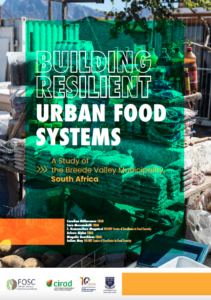Publication: Building Resilient Urban Food Systems: A Study of the Breede Valley Municipality, South Africa
DOI: ISBN 978-2-87614-846-8

This report addresses the following questions:
i) What is the structure of the BVM Food System in terms of key value chains and activities, and what are the drivers that shape the system? How does it interact with the broader institutional environment?
ii) To what extent is the governance of the core food system territorialized, i.e., is it rooted locally in the BVM territory, regionally or is it predominantly linked to broader Global Value Chains?
iii) How do stakeholders in the food system perceive climate change risks?
iv) What are the main sources of vulnerability in the BVM food system, and to what extent can it pursue more sustainable and resilient pathways?
The report is structured as follows: Section 2 presents the conceptual and methodological frameworks for analysing the BVM food system. Section 3 explores the multifaceted drivers of the food system, including food consumption, the production environment and the policy strategies that affect the territorial food system. Section 4 discusses the food system’s core function, by examining three of the principal food value chains. Lastly, Section 5 assesses the food system’s outcomes and resilience in relation to transformative pathways.



